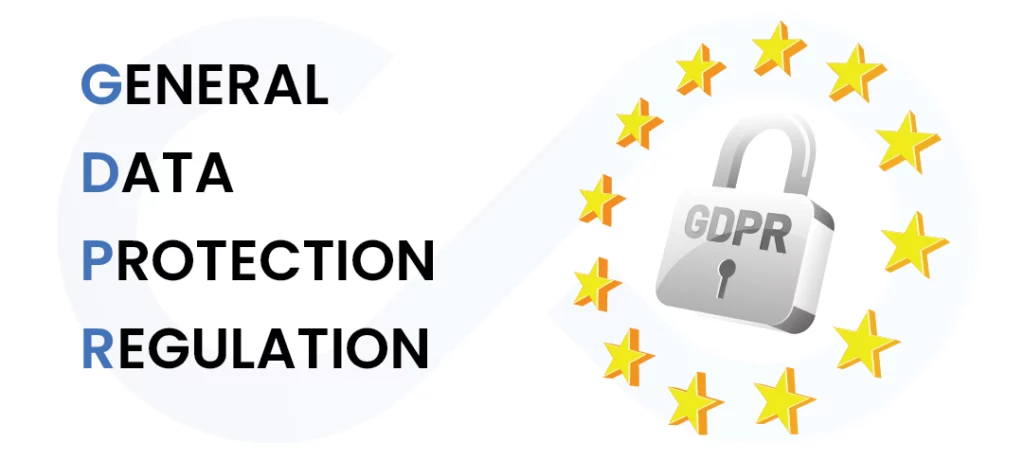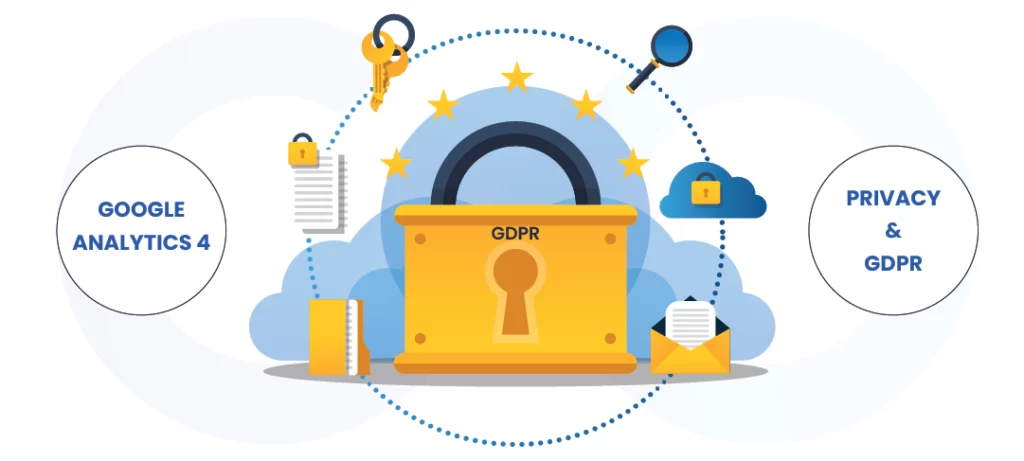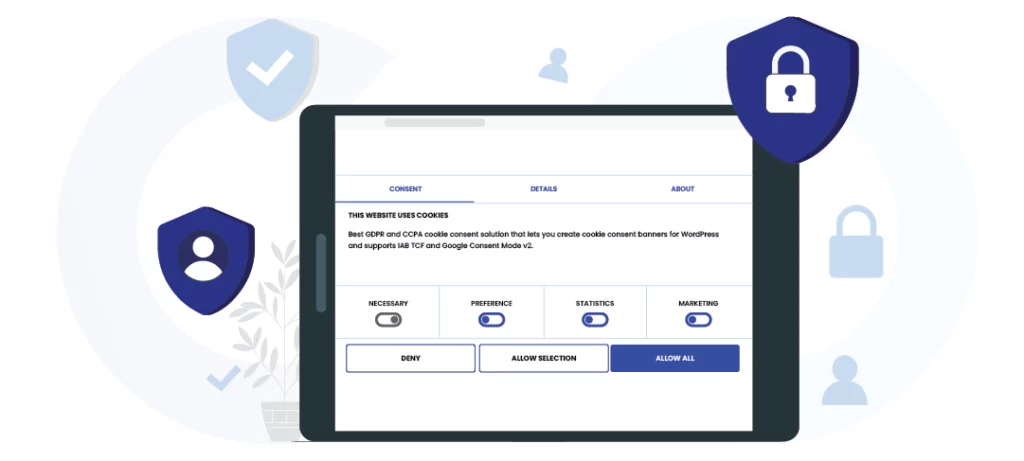The standard, non-customized setup of Google Analytics is not just a technical issue; it’s a matter of legal compliance with GDPR and CCPA, which is crucial for website owners.
Due to requirements like the General Data Protection Regulation (GDPR), which standardizes data privacy in the European Union and mandates explicit consent for data collection, most machine learning projects can succeed only with access to a wide sample of source data.
To make Google Analytics GDPR compliant, you need to go further to get your website analytics compliant with these standards.

What is GDPR?
In 2018, the European Union implemented GDPR, a broad data privacy law. It is intended to give citizens greater control over their data and to standardize the way data privacy laws are implemented across Europe.
Calculating and Analyzing GDPR requires organizations to strictly consider explicit consent before capturing personal data and complete visibility in data processing.
It also provides data subjects with a series of rights, such as the right of access, rectification, cancellation, and portability of their data, making it a reference in the worldwide legal landscape.

What is CCPA?
The second most popular answer was The California Consumer Privacy Act (CCPA) in 2020. Designed to significantly enhance privacy rights and consumer protection for California residents, the CCPA is similar to GDPR.
The CCPA applies to companies that collect the personal identifying information (PII) of California residents under certain conditions.
CCPA provides some similar rights to California residents:
- Right to Know What Personal Information is Collected, Used, Shared, or Sold
- Delete personal information held by businesses.
- Opt-out rights on Selling Personal Information:
- CCPA Right to Non-Discrimination for Exercising Rights.
Your Google Analytics setup must be up to CCPA standards to avoid any legal troubles and keep that trust.

Is Google Analytics GDPR Compliant?
Google Analytics is not GDPR compliant by default. Failure to comply with GDPR and CCPA, which require explicit consent before collecting or processing any personal information of an EU resident or citizen, can lead to severe legal consequences. This poses a significant challenge for Google Analytics users, as the tool can collect various types of personal data.
Google Analytics often gathers user IDs, hashed personal data, cookies, and behavioral profiling event data—all of which fall under GDPR’s scope. To maintain compliance while using Google Analytics, you have two primary options:
- Anonymize potentially personal identifying data, such as IP addresses.
- Obtain explicit consent from users before loading the Google Analytics script.
Without proper consent, you cannot share Demographics and Interest reports with your Remarketing or Advertising (Google Ads) account. This limitation can significantly impact your marketing strategies.

Furthermore, you need to adjust the data retention controls in Google Analytics. This step ensures that you maintain historical data access and the ability to view custom reports while still adhering to GDPR’s data minimization principle.
Now that we’ve clarified how GDPR consent applies to Google Analytics, it’s crucial to take active steps to make your site compliant. This will safeguard both your users’ privacy and your Business’s reputation.

What is the role of the Cookiebot Consent plugin?
The Cookiebot Consent plugin is a robust solution to make your website compliant with various data privacy regulations such as GDPR, CCPA, etc. It serves as a Consent Management Platform (CMP) that ensures compliance with cookie consent practices. Here’s how Cookiebot CMP can make it easier for you:
- Consent by Region: This tool lets you customize cookie consent for different regions, which is critical to adhering to local laws such as GDPR, CCPA, LGPD, and POPIA.
- Google Consent Mode—Cookiebot integrates with Google’s Consent Mode to give you control over Google’s tags based on your users’ consent.
- Enabling Comprehensive Scanning: it scans your website and recognizes and categorizes every cookie and tracker, giving the user choices.
- Over 40+ Support in Multi-lingual: Support not just in English but more than 40 languages for better communication to the global Audience.
- Keep Audit-Ready Records: Cookiebot securely records consent and holds logs of each consent, which is vital when proving audit compliance.

Things You Need To Know
- Update your privacy policy: Make sure that your privacy policy is up-to-date. It also needs to clearly outline your data collection and processing practices. This policy should include information about how you are complying with GDPR and CCPA regulations.
- Use encryption: You must ensure that you collect any personal data encrypted and store it securely. This can help protect user data from hackers and other malicious actors.
- Keep records: Keep detailed records of all data processing activities. And make sure that you can easily access and delete user data if requested.
How to Integrate with Consent Plugins?
You have the facility to make your Conversios plugin achieve GDPR and CCPA compatibility by offering it with diverse consent management plugins.
Such as RealCookie Banner (Cookies), CookieYes, Cookiebot, and GDPR Compliance Cookie Consent Plugins. This makes these tools fully compatible with the Conversios plugin respecting analytics data blocks until the user gives the proper agreement.

Conclusion
To sum up, it is strictly required to comply with GDPR and CCPA for your website analytics to prevent any legal issues and fraud to the users. This is not the case of course, but the integration of additional consent management services can make Google Analytics compliant.
With this, you can also integrate plugins that can give explicit consent approval to the users, change consent preferences for users based on region, and maintain audit-ready records. Updating your privacy policy, encryption and a solid record of everything you do will also assure your compliance.
Putting data protection laws first not only makes your clients safe and secure but also saves the face and repute of your business.
V2 consent enables website owners to customize how Google tags respond to user’s consent status for cookie usage.
Conversios supports Google V2 Consent & is compatible with Real Cookie Banner, GDPR Cookie Compliance, CookieBot, CookieYes, and more.
Frequently Asked Questions
Q. Is Google Analytics GDPR compliant by default?
No, Google Analytics is not GDPR compliant by default. You must either anonymize personal data or collect explicit user consent before using it on your site.
Q. What steps should I take to make Google Analytics GDPR compliant?
You should anonymize user IPs, obtain consent before loading the script, and configure data retention settings according to GDPR guidelines.
Q. What is CCPA and how does it differ from GDPR?
CCPA (California Consumer Privacy Act) protects the data rights of California residents, offering opt-out rights and access to collected data. GDPR is broader, applying to all EU citizens and requiring explicit opt-in consent.
Q. How can the Conversios plugin help with GDPR and CCPA compliance?
Conversios integrates with consent management tools like Cookiebot, Real Cookie Banner, and CookieYes to block analytics and advertising scripts until user consent is received.
Q. What is the Cookiebot Consent plugin and how does it help?
Cookiebot is a CMP that manages user consent for cookies and integrates with Google Consent Mode. It allows geo-targeted consent, multi-language support, cookie scanning, and stores consent logs for audits.
Q. What else should I do to stay compliant with GDPR and CCPA?
Update your privacy policy, use encryption for data storage, maintain audit-ready logs, and provide options to access or delete user data upon request.
